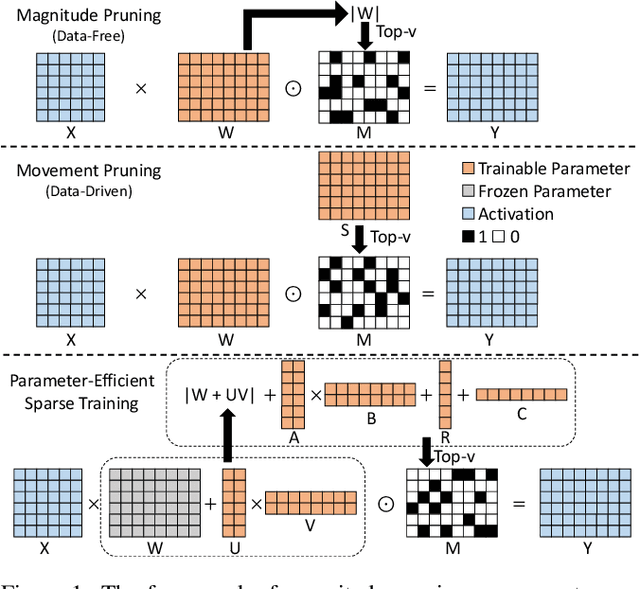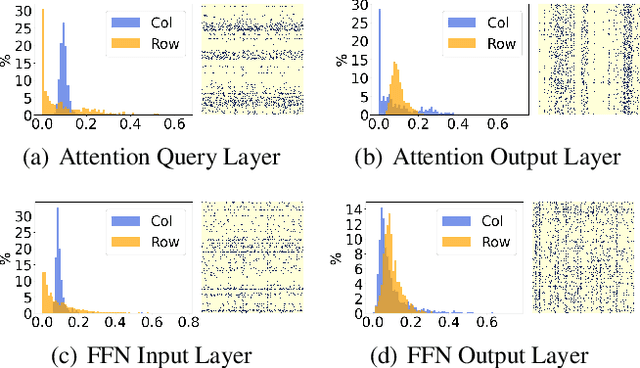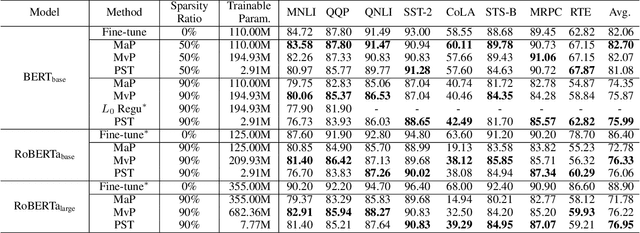Fuli Luo
HySparse: A Hybrid Sparse Attention Architecture with Oracle Token Selection and KV Cache Sharing
Feb 03, 2026Abstract:This work introduces Hybrid Sparse Attention (HySparse), a new architecture that interleaves each full attention layer with several sparse attention layers. While conceptually simple, HySparse strategically derives each sparse layer's token selection and KV caches directly from the preceding full attention layer. This architecture resolves two fundamental limitations of prior sparse attention methods. First, conventional approaches typically rely on additional proxies to predict token importance, introducing extra complexity and potentially suboptimal performance. In contrast, HySparse uses the full attention layer as a precise oracle to identify important tokens. Second, existing sparse attention designs often reduce computation without saving KV cache. HySparse enables sparse attention layers to reuse the full attention KV cache, thereby reducing both computation and memory. We evaluate HySparse on both 7B dense and 80B MoE models. Across all settings, HySparse consistently outperforms both full attention and hybrid SWA baselines. Notably, in the 80B MoE model with 49 total layers, only 5 layers employ full attention, yet HySparse achieves substantial performance gains while reducing KV cache storage by nearly 10x.
MiMo-V2-Flash Technical Report
Jan 08, 2026Abstract:We present MiMo-V2-Flash, a Mixture-of-Experts (MoE) model with 309B total parameters and 15B active parameters, designed for fast, strong reasoning and agentic capabilities. MiMo-V2-Flash adopts a hybrid attention architecture that interleaves Sliding Window Attention (SWA) with global attention, with a 128-token sliding window under a 5:1 hybrid ratio. The model is pre-trained on 27 trillion tokens with Multi-Token Prediction (MTP), employing a native 32k context length and subsequently extended to 256k. To efficiently scale post-training compute, MiMo-V2-Flash introduces a novel Multi-Teacher On-Policy Distillation (MOPD) paradigm. In this framework, domain-specialized teachers (e.g., trained via large-scale reinforcement learning) provide dense and token-level reward, enabling the student model to perfectly master teacher expertise. MiMo-V2-Flash rivals top-tier open-weight models such as DeepSeek-V3.2 and Kimi-K2, despite using only 1/2 and 1/3 of their total parameters, respectively. During inference, by repurposing MTP as a draft model for speculative decoding, MiMo-V2-Flash achieves up to 3.6 acceptance length and 2.6x decoding speedup with three MTP layers. We open-source both the model weights and the three-layer MTP weights to foster open research and community collaboration.
GroundingME: Exposing the Visual Grounding Gap in MLLMs through Multi-Dimensional Evaluation
Dec 19, 2025Abstract:Visual grounding, localizing objects from natural language descriptions, represents a critical bridge between language and vision understanding. While multimodal large language models (MLLMs) achieve impressive scores on existing benchmarks, a fundamental question remains: can MLLMs truly ground language in vision with human-like sophistication, or are they merely pattern-matching on simplified datasets? Current benchmarks fail to capture real-world complexity where humans effortlessly navigate ambiguous references and recognize when grounding is impossible. To rigorously assess MLLMs' true capabilities, we introduce GroundingME, a benchmark that systematically challenges models across four critical dimensions: (1) Discriminative, distinguishing highly similar objects, (2) Spatial, understanding complex relational descriptions, (3) Limited, handling occlusions or tiny objects, and (4) Rejection, recognizing ungroundable queries. Through careful curation combining automated generation with human verification, we create 1,005 challenging examples mirroring real-world complexity. Evaluating 25 state-of-the-art MLLMs reveals a profound capability gap: the best model achieves only 45.1% accuracy, while most score 0% on rejection tasks, reflexively hallucinating objects rather than acknowledging their absence, raising critical safety concerns for deployment. We explore two strategies for improvements: (1) test-time scaling selects optimal response by thinking trajectory to improve complex grounding by up to 2.9%, and (2) data-mixture training teaches models to recognize ungroundable queries, boosting rejection accuracy from 0% to 27.9%. GroundingME thus serves as both a diagnostic tool revealing current limitations in MLLMs and a roadmap toward human-level visual grounding.
DeepSeek-V3 Technical Report
Dec 27, 2024



Abstract:We present DeepSeek-V3, a strong Mixture-of-Experts (MoE) language model with 671B total parameters with 37B activated for each token. To achieve efficient inference and cost-effective training, DeepSeek-V3 adopts Multi-head Latent Attention (MLA) and DeepSeekMoE architectures, which were thoroughly validated in DeepSeek-V2. Furthermore, DeepSeek-V3 pioneers an auxiliary-loss-free strategy for load balancing and sets a multi-token prediction training objective for stronger performance. We pre-train DeepSeek-V3 on 14.8 trillion diverse and high-quality tokens, followed by Supervised Fine-Tuning and Reinforcement Learning stages to fully harness its capabilities. Comprehensive evaluations reveal that DeepSeek-V3 outperforms other open-source models and achieves performance comparable to leading closed-source models. Despite its excellent performance, DeepSeek-V3 requires only 2.788M H800 GPU hours for its full training. In addition, its training process is remarkably stable. Throughout the entire training process, we did not experience any irrecoverable loss spikes or perform any rollbacks. The model checkpoints are available at https://github.com/deepseek-ai/DeepSeek-V3.
DeepSeek-Prover-V1.5: Harnessing Proof Assistant Feedback for Reinforcement Learning and Monte-Carlo Tree Search
Aug 15, 2024



Abstract:We introduce DeepSeek-Prover-V1.5, an open-source language model designed for theorem proving in Lean 4, which enhances DeepSeek-Prover-V1 by optimizing both training and inference processes. Pre-trained on DeepSeekMath-Base with specialization in formal mathematical languages, the model undergoes supervised fine-tuning using an enhanced formal theorem proving dataset derived from DeepSeek-Prover-V1. Further refinement is achieved through reinforcement learning from proof assistant feedback (RLPAF). Beyond the single-pass whole-proof generation approach of DeepSeek-Prover-V1, we propose RMaxTS, a variant of Monte-Carlo tree search that employs an intrinsic-reward-driven exploration strategy to generate diverse proof paths. DeepSeek-Prover-V1.5 demonstrates significant improvements over DeepSeek-Prover-V1, achieving new state-of-the-art results on the test set of the high school level miniF2F benchmark ($63.5\%$) and the undergraduate level ProofNet benchmark ($25.3\%$).
DeepSeek-Coder-V2: Breaking the Barrier of Closed-Source Models in Code Intelligence
Jun 17, 2024



Abstract:We present DeepSeek-Coder-V2, an open-source Mixture-of-Experts (MoE) code language model that achieves performance comparable to GPT4-Turbo in code-specific tasks. Specifically, DeepSeek-Coder-V2 is further pre-trained from an intermediate checkpoint of DeepSeek-V2 with additional 6 trillion tokens. Through this continued pre-training, DeepSeek-Coder-V2 substantially enhances the coding and mathematical reasoning capabilities of DeepSeek-V2, while maintaining comparable performance in general language tasks. Compared to DeepSeek-Coder-33B, DeepSeek-Coder-V2 demonstrates significant advancements in various aspects of code-related tasks, as well as reasoning and general capabilities. Additionally, DeepSeek-Coder-V2 expands its support for programming languages from 86 to 338, while extending the context length from 16K to 128K. In standard benchmark evaluations, DeepSeek-Coder-V2 achieves superior performance compared to closed-source models such as GPT4-Turbo, Claude 3 Opus, and Gemini 1.5 Pro in coding and math benchmarks.
DeepSeek-Coder: When the Large Language Model Meets Programming -- The Rise of Code Intelligence
Jan 26, 2024



Abstract:The rapid development of large language models has revolutionized code intelligence in software development. However, the predominance of closed-source models has restricted extensive research and development. To address this, we introduce the DeepSeek-Coder series, a range of open-source code models with sizes from 1.3B to 33B, trained from scratch on 2 trillion tokens. These models are pre-trained on a high-quality project-level code corpus and employ a fill-in-the-blank task with a 16K window to enhance code generation and infilling. Our extensive evaluations demonstrate that DeepSeek-Coder not only achieves state-of-the-art performance among open-source code models across multiple benchmarks but also surpasses existing closed-source models like Codex and GPT-3.5. Furthermore, DeepSeek-Coder models are under a permissive license that allows for both research and unrestricted commercial use.
DeepSeekMoE: Towards Ultimate Expert Specialization in Mixture-of-Experts Language Models
Jan 11, 2024



Abstract:In the era of large language models, Mixture-of-Experts (MoE) is a promising architecture for managing computational costs when scaling up model parameters. However, conventional MoE architectures like GShard, which activate the top-$K$ out of $N$ experts, face challenges in ensuring expert specialization, i.e. each expert acquires non-overlapping and focused knowledge. In response, we propose the DeepSeekMoE architecture towards ultimate expert specialization. It involves two principal strategies: (1) finely segmenting the experts into $mN$ ones and activating $mK$ from them, allowing for a more flexible combination of activated experts; (2) isolating $K_s$ experts as shared ones, aiming at capturing common knowledge and mitigating redundancy in routed experts. Starting from a modest scale with 2B parameters, we demonstrate that DeepSeekMoE 2B achieves comparable performance with GShard 2.9B, which has 1.5 times the expert parameters and computation. In addition, DeepSeekMoE 2B nearly approaches the performance of its dense counterpart with the same number of total parameters, which set the upper bound of MoE models. Subsequently, we scale up DeepSeekMoE to 16B parameters and show that it achieves comparable performance with LLaMA2 7B, with only about 40% of computations. Further, our preliminary efforts to scale up DeepSeekMoE to 145B parameters consistently validate its substantial advantages over the GShard architecture, and show its performance comparable with DeepSeek 67B, using only 28.5% (maybe even 18.2%) of computations.
DeepSeek LLM: Scaling Open-Source Language Models with Longtermism
Jan 05, 2024



Abstract:The rapid development of open-source large language models (LLMs) has been truly remarkable. However, the scaling law described in previous literature presents varying conclusions, which casts a dark cloud over scaling LLMs. We delve into the study of scaling laws and present our distinctive findings that facilitate scaling of large scale models in two commonly used open-source configurations, 7B and 67B. Guided by the scaling laws, we introduce DeepSeek LLM, a project dedicated to advancing open-source language models with a long-term perspective. To support the pre-training phase, we have developed a dataset that currently consists of 2 trillion tokens and is continuously expanding. We further conduct supervised fine-tuning (SFT) and Direct Preference Optimization (DPO) on DeepSeek LLM Base models, resulting in the creation of DeepSeek Chat models. Our evaluation results demonstrate that DeepSeek LLM 67B surpasses LLaMA-2 70B on various benchmarks, particularly in the domains of code, mathematics, and reasoning. Furthermore, open-ended evaluations reveal that DeepSeek LLM 67B Chat exhibits superior performance compared to GPT-3.5.
Parameter-Efficient Sparsity for Large Language Models Fine-Tuning
May 23, 2022



Abstract:With the dramatically increased number of parameters in language models, sparsity methods have received ever-increasing research focus to compress and accelerate the models. While most research focuses on how to accurately retain appropriate weights while maintaining the performance of the compressed model, there are challenges in the computational overhead and memory footprint of sparse training when compressing large-scale language models. To address this problem, we propose a Parameter-efficient Sparse Training (PST) method to reduce the number of trainable parameters during sparse-aware training in downstream tasks. Specifically, we first combine the data-free and data-driven criteria to efficiently and accurately measure the importance of weights. Then we investigate the intrinsic redundancy of data-driven weight importance and derive two obvious characteristics i.e., low-rankness and structuredness. Based on that, two groups of small matrices are introduced to compute the data-driven importance of weights, instead of using the original large importance score matrix, which therefore makes the sparse training resource-efficient and parameter-efficient. Experiments with diverse networks (i.e., BERT, RoBERTa and GPT-2) on dozens of datasets demonstrate PST performs on par or better than previous sparsity methods, despite only training a small number of parameters. For instance, compared with previous sparsity methods, our PST only requires 1.5% trainable parameters to achieve comparable performance on BERT.
 Add to Chrome
Add to Chrome Add to Firefox
Add to Firefox Add to Edge
Add to Edge